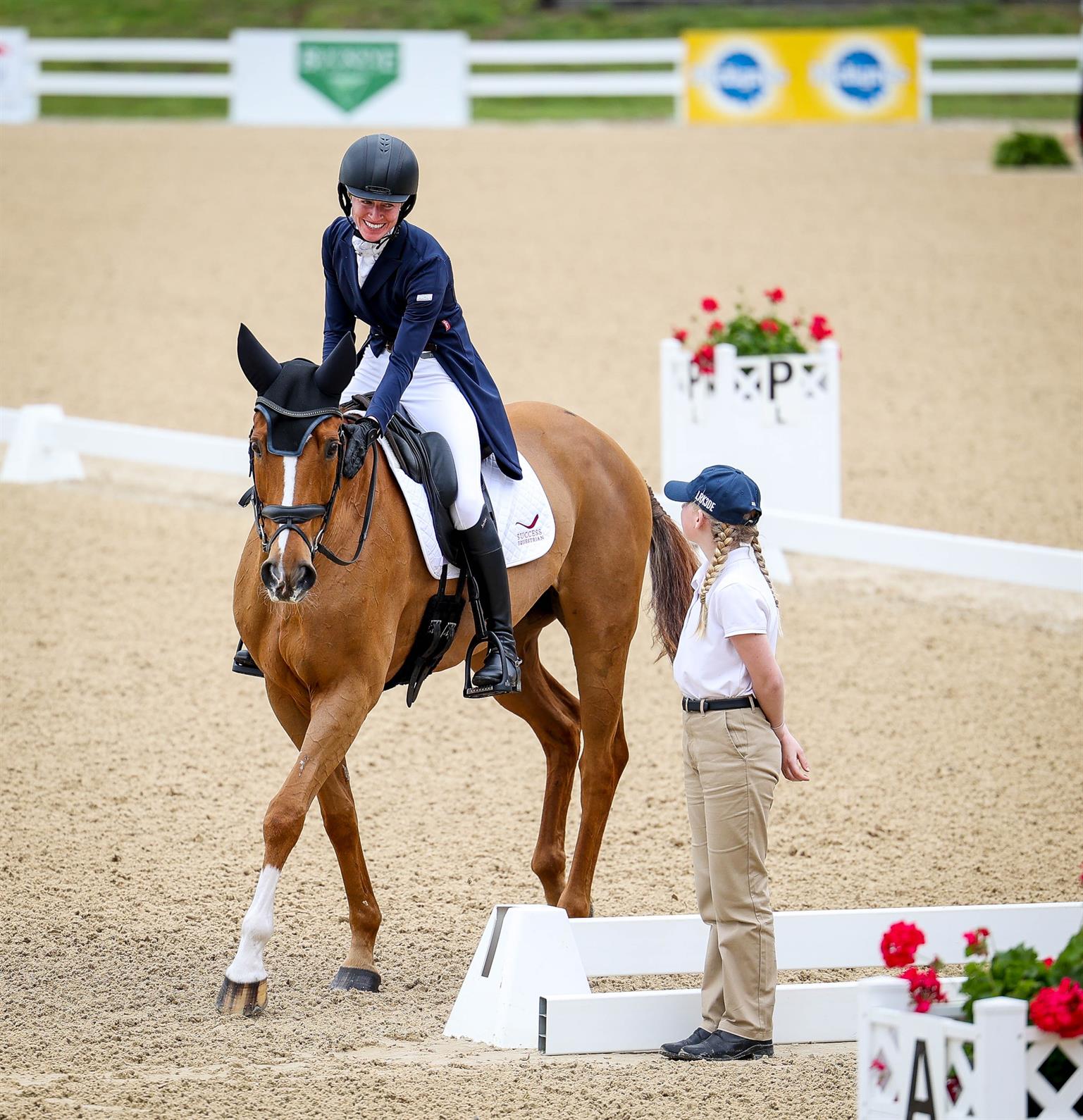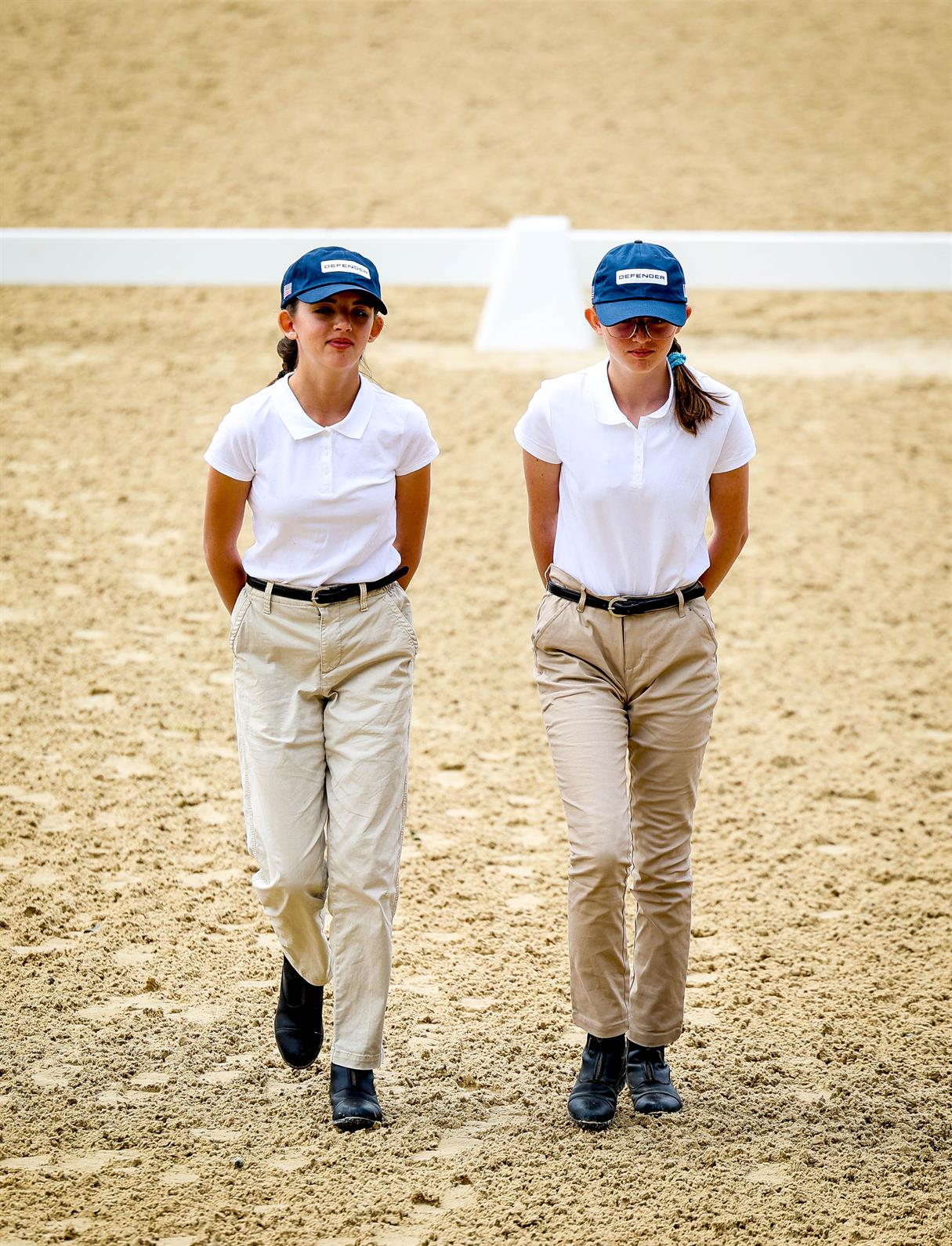Lexington, Ky. - Much like the children who retrieve tennis balls at Wimbledon, the youth volunteers at the Defender Kentucky Three-Day Event presented by MARS Equestrian™ (K3DE) are essential to the dressage competition running smoothly.

Assistant Dressage Arena Steward Emily Watson oversees the youth volunteers at the event.
“The hardest part for them is staying still, but they all do a really, really good job,” Watson said. “After a while, they tend to know what to do, and it gets easier…The big kids teach the little kids.”
The youth volunteers have three main duties. One group opens and closes the gate between dressage tests. Another group picks up dressage tests from scorekeepers and judges, handing them off to the third group of volunteers, who “run up two flights of stairs to hand the test to the scorers, and then run back down,” according to Watson. Volunteers who stay with the program past age 16 move on to become e-scribes, who sit in the judging booth and record scores.
Lydia McKenzie, 18, who has competed in eventing and been involved with Hunter’s Run Pony Club for eight years, has volunteered at the K3DE since 2021.
“I had a couple of friends who had previously been involved in volunteering in the dressage ring, and I was like, ‘Oh my gosh, I'd love to do that. I want to be involved in the ring and shake riders’ hands,’” McKenzie said. “When I first volunteered…I was one of the test collectors to start out, and we kind of just sit and wait, go get the test.”
Eventually, McKenzie moved up to the judges’ booth and became an e-scribe.
“It’s been a really awesome experience being able to interact with the judges, see their input, and just get a different perspective,” McKenzie said. “I am able to watch the test, I keep my hands on the numbers, I click, and I press enter. It's very, very specific…I really enjoy being able to listen to the comments of the judge while also being able to watch.”
Suzanna Hall, 14, has been volunteering at the K3DE since she was eight years old, opening the gates and retrieving dressage tests. Both Hall and her mother, Kari Estes, ride with Watson, which is how Hall got involved in volunteering.
“There were children from our barn volunteering, and Suzanna was finally old enough where she could volunteer,” Estes explained.
Watson explained that, contrary to popular belief, not all the volunteers come from the Keeneland Pony Club. In fact, she oversees volunteers from Ohio and Indiana as well as Kentucky.
“We have a pony club that we use out of Ohio, and a mom will call and say, ‘We have two 10-year-olds that would like to do this,’ and if we have availability, then we pull those kids on,” Watson said. “A good portion will do it all of their middle school years, and then some of their high school years.”
Watson said that running the volunteer program comes with its fair share of challenges. She explained that due to budget restraints, the number of volunteers at the K3DE has been decreasing. This year, Watson is in charge of 13 volunteers.
“(The volunteers) get a T-shirt, they get a hat, they get a pin, they get a cup, and then they get a lunch pass for $10 each. So, if you have 30 more people, it's like an extra $1000. We really didn't need all those people, so it was just a way to keep the budget from exploding,” Watson said. “I try and create (schedules) so they all have a break. Now that we have the four-star (competition), the days are much longer…They have to get there at about 7 a.m., so that's hard for some.”
Hall explained that these mornings have been the most difficult part of her volunteer experience, but not because of their early start.
“Sometimes the temperatures in the morning are really cold, and we just have to sit out there,” Hall said. “Whenever we open the gate and stuff, we're just standing out there, so it's a little difficult.”

Other difficulties are more logistical, such as the way the dressage tests are written affecting the flow of volunteer movement.
“There are five different places you could halt in the dressage test, and the worst one is right as they turn up the center line. Our kids aren't supposed to move until that horse has made the turn, and depending on how they set up the dressage arena, sometimes it's really difficult for them to get there in time,” Watson explained. “They have to walk so far, and the horse doesn't get to walk so far, so sometimes logistically, it's a bit of a challenge. We always have a parent sitting with them to send them at the appropriate time.”
McKenzie mentioned that being an e-scribe comes with a fair bit of pressure to record the proper scores.
“I definitely get a little bit stressed out, hovering over the keyboard, ready to put the right number, but…the judges really are so kind,” McKenzie said. “They make you feel like you're important.”
Despite the challenges volunteers face, Watson tries her best to maintain a fun atmosphere at events.
“There's a woman named Anita Bolen, and she does a food tent. I think it started to be a food tent for riders, but it's really a food tent for all of us; she brings in coffee and donuts and some other snacks. But after 1:30, she brings out the chocolate, so it gives everybody a little bit of boost for the afternoon sessions,” Watson said. “We also get a short lunch break, and so I try to do something fun for them. Athletes give course walks during the day, and obviously our kids can't go on those course walks because their shifts wouldn't allow it. But I get one of the five-star riders to come and give them a mini course walk during the lunch break.”
Watson said that for many volunteers, the best part of their experience is getting to watch the showmanship of professional equestrians, taking home skills to help their own riding.
“All of them ride horses, but to be able to see the way the upper athletes present themselves is something that they all take back,” Watson said. “It's hard to do something if you can't see what your ultimate goal is, and so this way, they get to sit there and see exactly what they're trying to attain. We always say perfection is impossible, but…if you can achieve excellence, that's great. And that's what they're watching; we're watching excellence, but not perfection.”
Hall, who competes in eventing at the novice level, said that volunteering at the K3DE has helped her develop her horsemanship skills. She also said she is excited to volunteer again.
“It's really interesting to watch all the different people go in and do the same tests, but have different horses and different ways of riding,” Hall said. “I get to watch and see how people prepare for their transitions, how they use their legs, or just how their horse looks. I kind of realize how my body needs to be positioned in order to make my horse look the best he can.”
“Now, when I approach a test. I say, ‘Okay, what is the judge looking for with the horse?’...Seeing those critiques that they give has really helped me in understanding what the tests are looking for and what the judges want,” McKenzie said. “I would like to…hopefully volunteer in some other aspect of the dressage competition, cross country, or show jumping, whatever it may be.”


